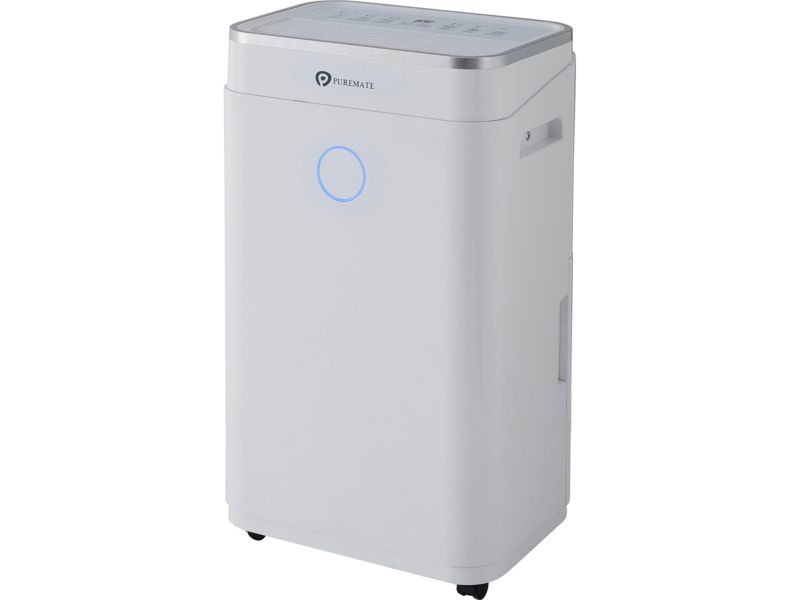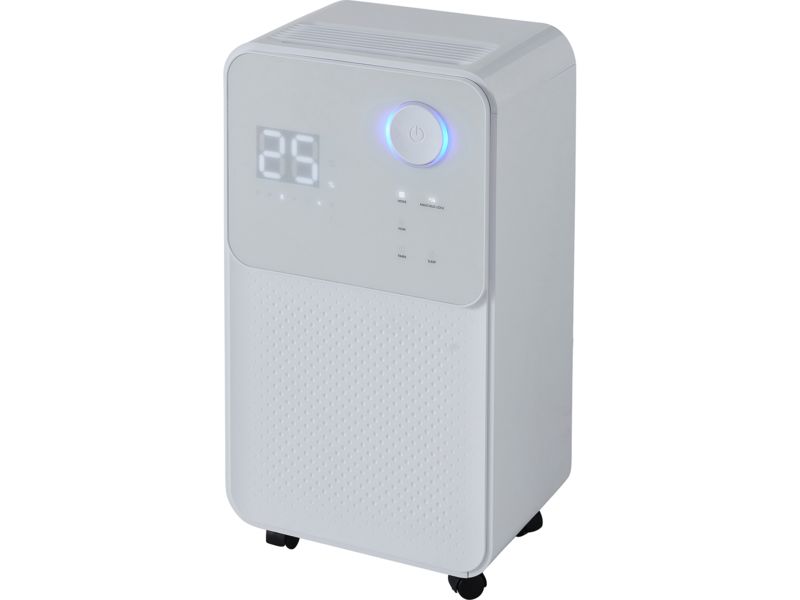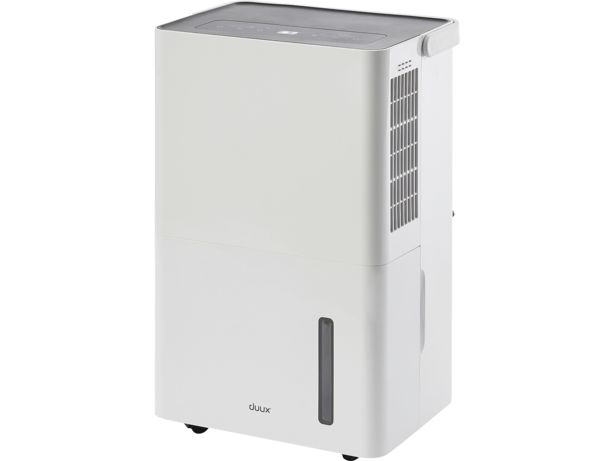How we test dehumidifiers

In this article
- How much water does each dehumidifier extract from the air?
- How much energy does each dehumidifier use?
- How noisy is each dehumidifier?
- How easy is each dehumidifier to use?
- Does the humidistat function work effectively?
- Could my smart dehumidifier get hacked?
- Should I buy it?
- What are Which? Best Buys, Don't Buys, and Great Value Models?
Which? tests more thoroughly than anywhere else to make sure we only recommend the very best dehumidifiers – and guide you away from those that don’t make the grade.
Our test results and ratings reveal big differences between the best and worst dehumidifiers you might buy in the shops. A good dehumidifier will extract significantly more water from the air of your home, work quietly and do this without guzzling excess electricity.
We've reviewed most of the dehumidifiers you're likely to come across, and rated them from a dazzling Best Buy at 83% to a low-scorer at 45%. Those models that score 79% or more get a Best Buy recommendation from us. Those that score 45% or lower get a Don't Buy label, so you know which models to avoid.
Our reviews answer the important dehumidifier questions, including:
- How much water does the dehumidifier extract from the air?
- How much energy does the dehumidifier use?
- How noisy is it?
- How easy is it to use?
- Does the humidistat function work effectively?
- Should I buy it?
Head to our dehumidifier reviews to find the best dehumidifier for your needs and budget – or read on for more details of how we test.
How much water does each dehumidifier extract from the air?
We put each dehumidifier on its maximum setting and run it twice over for an hour at normal room temperature, using a special climate-controlled test room. From these two test runs, we work out the average amount of water pulled from the air – we compare these results to other dehumidifiers to generate star ratings.
We then cool down the room to the kind of temperature you’d expect in an unheated caravan or conservatory and run our duo of water extraction tests again. This enables us to see how well the dehumidifier works in the cold.
Our star ratings help you see which dehumidifiers are the best at their core job of quickly pulling water from the air at different temperatures to help you remove condensation, help solve damp, and prevent mould growth in different rooms around your house. You'll also be able to see which dehumidifiers are best avoided.

How much energy does each dehumidifier use?
We measure the energy consumption of each dehumidifier at normal room temperature while we’re carrying out our water extraction tests. This gives us a reading of the power the dehumidifier uses, which we use to calculate our energy efficiency rating.
A less energy-efficient dehumidifier will cost you more to run, so it’s worth checking out our dehumidifier reviews to make sure you don’t pick an energy guzzler.
How noisy is each dehumidifier?
Our expert lab testers subjectively rate how noisy each dehumidifier is. This can range from a gentle, barely noticeable hum to a great gurgling that makes the unit sound like it’s about to take off.
Some dehumidifiers have variable speeds, so we also check how much noise each one makes at its highest and lowest settings.
If you're planning on using your dehumidifier in a room you spend plenty of time in – such as a bedroom or living room – then you can use our noise rating to make sure you pick a quiet model that won't get on your nerves.
How easy is each dehumidifier to use?
When buying a new dehumidifier, you’ll want to avoid one that’s a pain to use. Our ease-of-use assessments include how simple it is to use the controls, whether emptying the water tank is likely to cause any problems, and whether it’s easy to move the unit around.
We also look at the instruction manual to check that it’s clear to follow and understand. Our ease of use tests combine to generate an overall star rating. You can use this rating to avoid any models that are likely to be a pain to use.
Does the humidistat function work effectively?
Many dehumidifiers have a humidistat function that you can use to program the dehumidifier to turn itself on and off at specified humidity levels. We test how well the humidistat function works in room temperature by asking it to turn the dehumidifier on and off at certain humidity levels.

Could my smart dehumidifier get hacked?
Although your dehumidifier may seem an unlikely device for a hacker to target, if you have a 'smart' dehumidifier (that lets you connect it to the internet and control it via a smartphone app), it could be storing a lot of personal data about you and your home. This could be used to build a detailed picture of your daily routine – when you're usually out of the house, for example.
It could also be used as an entry point to your entire home network, potentially compromising other devices such as laptops and smartphones.
We put every smart dehumidifier we test through a wide range of privacy and security tests, to check for any loopholes that a hacker could exploit. These include:
- Password security: Does the device have a weak default password, such as ‘admin’, that you aren’t forced to change when you first set it up? If you are able to set your own password, does the app or device make sure this can't be easily guessed by a hacker?
- Updates: We check how frequently your device will be maintained with software updates. Software that’s out of date or hasn’t been maintained could leave gaps that a hacker could use to access your dehumidifier.
- Data encryption: We check that your personal data is encrypted so it can’t be read by others. We also look at where it’s been sent, particularly if that’s outside the EEA (European Economic Area).
- Decommissioning: If you want to sell your dehumidifier, we look at how easy it is to reset the device and wipe your data so it can’t be accessed by the new owner.
- Man in the middle attacks: Our tests check whether your device is vulnerable to this kind of attack, in which a hacker can intercept information passing to and from your smart dehumidifier.
If we find any concerning privacy or security issues, we contact the manufacturer to further investigate.
If these are significant concerns based on our evaluation, we can hold back a product from being a Best Buy until the issue is fixed by the manufacturer. For very serious issues that will not get fixed, we can automatically make the product a Don’t Buy.
Should I buy it?
All of the assessments above contribute to a total test score, which is the overall percentage figure we give to each dehumidifier.
Some tests are more important than others in determining just how good each dehumidifier is, and so count for more in our overall score. For instance, we think that water extraction is more important than how easy each dehumidifier is to use.
The total test score ignores price and is made up of the following:
- 40% water extraction
- 20% noise
- 20% energy efficiency
- 15% ease of use
- 5% humidistat function
A dehumidifier needs to earn at least 79% in our lab tests to earn our Best Buy recommendation.

What are Which? Best Buys, Don't Buys, and Great Value Models?
The dehumidifiers that impress the most in our tests are made Best Buys. A dehumidifier needs to earn 79% in our tests to become a Best Buy, but you should still read our reviews to check for any factors that might impact your buying decision.
Dehumidifiers that receive a poor score of 45% or lower are Don't Buys and should be avoided - these are likely to have performed poorly or only averagely in our water extraction tests, and may be very noisy or inefficient when using energy.
Great Value models do pretty well in our tests - they need to score at least 65% or more. They're also at least 20% cheaper than the average cost of other dehumidifiers we've tested. These are models highlighted by our experts to go for if you're looking for a bargain. Some Great Value models also score well enough to be a Best Buy.
Just want to know the best dehumidifiers to buy? Head to our list of best dehumidifiers for a model that excels across all of our key tests.






















